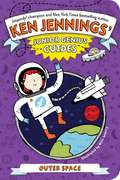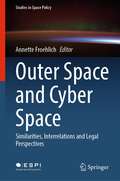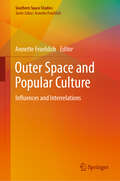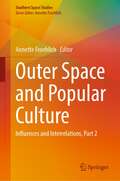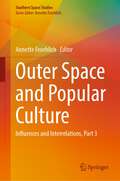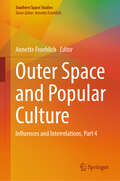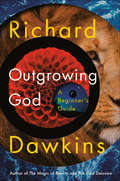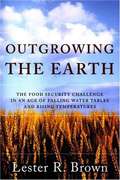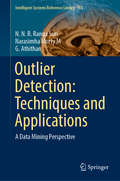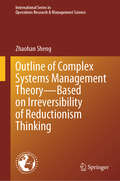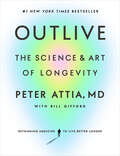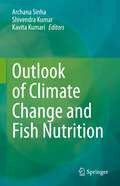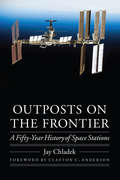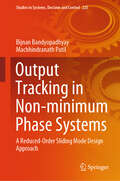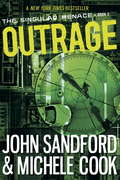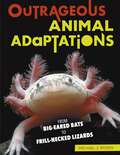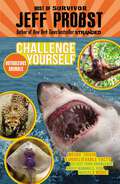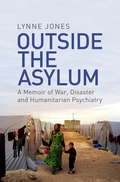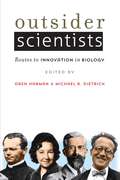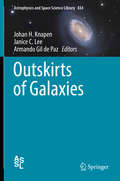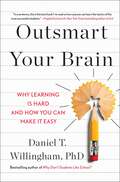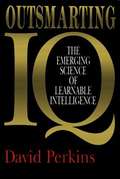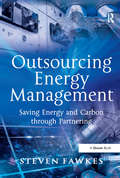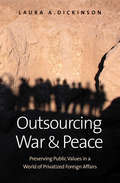- Table View
- List View
Outer Space (Ken Jennings’ Junior Genius Guides)
by Ken JenningsLet your inner astronaut explore outer space with this interactive trivia book from Jeopardy! champ and New York Times bestselling author Ken Jennings.With this book about space you’ll become an expert and wow your friends and teachers with out-of-this-world facts: Did you know that Mars has a volcano bigger than the state of Arizona? Or that there’s a star with a diamond the size of our moon at its core? With great illustrations, cool trivia, and fun quizzes to test your knowledge, this guide will have you on your way to whiz-kid status in no time!
Outer Space and Cyber Space: Similarities, Interrelations and Legal Perspectives (Studies in Space Policy #33)
by Annette FroehlichThe book analyses a broad range of relevant aspects as the outer space and cyber space domain do not only present analogies but are also strongly interrelated. This may occur on various levels by technologies but also in regard to juridical approaches, each nevertheless keeping its particularities. Since modern societies rely increasingly on space applications that depend on cyber space, it is important to investigate how cyberspace and outer space are connected by their common challenges. Furthermore, this book discusses not only questions around their jurisdictions, but also whether the private space industry can escape jurisdiction by dematerializing the space resource commercial processes and assets thanks to cyber technology. In addition, space and cyberspace policies are analysed especially in view of cyber threats to space communications. Even the question of an extra-terrestrial citizenship in outer space and cyberspace may raise new views. Finally, the interdependence between space and cyberspace also has an important role to play in the context of increasing militarization and emerging weaponization of outer space. Therefore, this book invites questioning the similarities and interrelations between Outer Space and Cyber Space in the same way as it intends to strengthen them.
Outer Space and Popular Culture: Influences and Interrelations (Southern Space Studies)
by Annette FroehlichThis book provides detailed insights into how space and popular culture intersect across a broad spectrum of examples, including cinema, music, art, arcade games, cartoons, comics, and advertisements. This is a pertinent topic since the use of space themes differs in different cultural contexts, and these themes can be used to explore various aspects of the human condition and provide a context for social commentary on politically sensitive issues. With the use of space imagery evolving over the past sixty years of the space age, this is a topic ripe for in-depth exploration. The book also discusses the contrasting visions of space from the late 19th and early 20th centuries and the reality of today, and analyzes space vehicles and habitats in popular depictions of space from an engineering perspective, exploring how many of those ideas have actually been implemented in practice, and why or why not (a case of life imitating art and vice versa). As such, it covers a wide array of relevant and timely topics examining intersections between space and popular culture, and offering accounts of space and its effect on culture, language, and storytelling from the southern regions of the world.
Outer Space and Popular Culture: Influences and Interrelations, Part 2 (Southern Space Studies)
by Annette FroehlichFollowing on from Part 1, which was highly acclaimed by the space community, this peer-viewed book provides detailed insights into how space and popular culture intersect across a broad spectrum of areas, including cinema, music, art, arcade games, cartoons, comics, and advertisements. This is a pertinent topic since the use of space themes differs in different cultural contexts, and these themes can be used to explore various aspects of the human condition and provide a context for social commentary on politically sensitive issues. With the use of space imagery evolving over the past sixty years of the space age, this topic is ripe for in-depth exploration. Covering a wide array of relevant and timely topics, the book examines the intersections between space and popular culture, and offers accounts of space and its effect on culture, language, and storytelling from the southern regions of the world.
Outer Space and Popular Culture: Influences and Interrelations, Part 3 (Southern Space Studies)
by Annette FroehlichThis book provides detailed insights into how space and popular culture intersect across a broad spectrum of examples, including cinema, music, art, arcade games, cartoons, comics, and advertisements. This is a pertinent topic since the use of space themes differs in different cultural contexts, and these themes can be used to explore various aspects of the human condition and provide a context for social commentary on politically sensitive issues. With the use of space imagery evolving over the past sixty years of the space age, this is a topic ripe for in-depth exploration. The book also discusses the contrasting visions of space from the late nineteenth and early twentieth centuries and the reality of today and analyzes space vehicles and habitats in popular depictions of space from an engineering perspective, exploring how many of those ideas have actually been implemented in practice and why or why not (a case of life imitating art and vice versa). As such, it covers a wide array of relevant and timely topics examining intersections between space and popular culture and offering accounts of space and its effect on culture, language, and storytelling from the southern regions of the world.
Outer Space and Popular Culture: Influences and Interrelations, Part 4 (Southern Space Studies)
by Annette FroehlichFollowing on from the highly acclaimed Parts 1 to 3, this book provides detailed insights into how space and popular culture intersect across a broad spectrum of examples, including cinema, music, art, arcade games, cartoons, comics, and advertisements. This is a pertinent topic since the use of space themes differs in different cultural contexts, and these themes can be used to explore various aspects of the human condition and provide a context for social commentary on politically sensitive issues. With the use of space imagery evolving over the past sixty years of the space age, this is a topic ripe for in-depth exploration. The book also discusses the contrasting visions of space from the late nineteenth and early twentieth centuries and the reality of today and analyzes space vehicles and habitats in popular depictions of space from an engineering perspective, exploring how many of those ideas have actually been implemented in practice and why or why not (a case of life imitating art and vice versa). As such, it covers a wide array of relevant and timely topics examining intersections between space and popular culture and offering accounts of space and its effect on culture, language, and storytelling from the southern regions of the world.
Outgrowing God: A Beginner's Guide
by Richard DawkinsShould we believe in God? In this brisk introduction to modern atheism, one of the world’s greatest science writers tells us why we shouldn’t.Richard Dawkins was fifteen when he stopped believing in God. Deeply impressed by the beauty and complexity of living things, he’d felt certain they must have had a designer. Learning about evolution changed his mind. Now one of the world’s best and bestselling science communicators, Dawkins has given readers, young and old, the same opportunity to rethink the big questions. In twelve fiercely funny, mind-expanding chapters, Dawkins explains how the natural world arose without a designer—the improbability and beauty of the “bottom-up programming” that engineers an embryo or a flock of starlings—and challenges head-on some of the most basic assumptions made by the world’s religions: Do you believe in God? Which one? Is the Bible a “Good Book”? Is adhering to a religion necessary, or even likely, to make people good to one another? Dissecting everything from Abraham’s abuse of Isaac to the construction of a snowflake, Outgrowing God is a concise, provocative guide to thinking for yourself.Advance praise for Outgrowing God“My son came home from his first day in the sixth grade with arms outstretched plaintively demanding to know: ‘Have you ever heard of Jesus?’ We burst out laughing. Maybe not our finest parenting moment, given that he was genuinely distraught. He felt that he had woken up one day to a world in which his peers were expressing beliefs he found frighteningly unreasonable. He began devouring books like The God Delusion, books that helped him formulate his own arguments and helped him stand his ground. Dawkins’s new book is special in the terrain of atheists’ pleas for humanism and rationalism precisely since it speaks to those most vulnerable to the coercive tactics of religion. As Dawkins himself says in the dedication, this book is for ‘all young people when they’re old enough to decide for themselves.’ It is also, I must add, for their parents.”—Janna Levin, author of Black Hole Blues “When someone is considering atheism I tell them to read the Bible first and then Dawkins. Outgrowing God—second only to the Bible!”—Penn Jillette, author of God, No!
Outgrowing the Earth: The Food Security Challenge in an Age of Falling Water Tables and Rising Temperatures
by Lester Brown"Historically food security was the responsibility of ministries of agriculture, but today that has changed. Recent research reporting that a 1-degree Celsius rise in temperature can reduce grain yields by 10 percent means that energy policy is now directly affecting crop production. Decisions made in ministries of energy may have a greater effect on future food security than those made in ministries of agriculture." "The bottom line is that future food security depends not only on efforts within agriculture but also on energy policies that stabilize climate, a worldwide effort to raise water productivity, the evolution of land-efficient transport systems, and population policies that seek a humane balance between population and food." "Outgrowing the Earth advances our thinking on food security issues that the world will be wrestling with for years to come."--BOOK JACKET. Title Summary field provided by Blackwell North America, Inc. All Rights Reserved
Outlier Detection: A Data Mining Perspective (Intelligent Systems Reference Library #155)
by N. N. Ranga Suri Narasimha Murty M G. AthithanThis book, drawing on recent literature, highlights several methodologies for the detection of outliers and explains how to apply them to solve several interesting real-life problems. The detection of objects that deviate from the norm in a data set is an essential task in data mining due to its significance in many contemporary applications. More specifically, the detection of fraud in e-commerce transactions and discovering anomalies in network data have become prominent tasks, given recent developments in the field of information and communication technologies and security. Accordingly, the book sheds light on specific state-of-the-art algorithmic approaches such as the community-based analysis of networks and characterization of temporal outliers present in dynamic networks. It offers a valuable resource for young researchers working in data mining, helping them understand the technical depth of the outlier detection problem and devise innovative solutions to address related challenges.
Outline of Complex Systems Management Theory— Based on Irreversibility of Reductionism Thinking (International Series in Operations Research & Management Science #360)
by Zhaohan ShengThis book, for the first time, proposes the complex systems management theory based on the integration of complex systems theory and management science to solve the overall complexity problem that cannot be dealt with by the reductionism approach. This theory not only provides a new way of thinking, but also introduces a novel logic for cognition, which has significant academic novelty and practical implications. In particular, by illustrating many real cases, it explains how to apply the complex systems management theory and contribute to practice. This book aims to build complex system management as a new integrated and fundamental concept in the field of management science that has significant potential, which has clear and important academic connotations. It develops a big-data-driven modeling technique for complex system scenarios based on the latest information technology to improve the ability of complex systems management theory in coping with the complexity of real problems. This book provides a new paradigm of thinking, a body of knowledge, and management tools for scholars and practitioners to analyze and solve problems with complex integrity.
Outlive: The Science and Art of Longevity
by Peter Attia MD#1 NEW YORK TIMES BESTSELLER • OVER TWO MILLION COPIES SOLD • A groundbreaking manifesto on living better and longer that challenges the conventional medical thinking on aging and reveals a new approach to preventing chronic disease and extending long-term health, from a visionary physician and leading longevity expert &“One of the most important books you&’ll ever read.&”—Steven D. Levitt, New York Times bestselling author of Freakonomics AN ECONOMIST AND BLOOMBERG BEST BOOK OF THE YEARWouldn&’t you like to live longer? And better? In this operating manual for longevity, Dr. Peter Attia draws on the latest science to deliver innovative nutritional interventions, techniques for optimizing exercise and sleep, and tools for addressing emotional and mental health. For all its successes, mainstream medicine has failed to make much progress against the diseases of aging that kill most people: heart disease, cancer, Alzheimer&’s disease, and type 2 diabetes. Too often, it intervenes with treatments too late to help, prolonging lifespan at the expense of healthspan, or quality of life. Dr. Attia believes we must replace this outdated framework with a personalized, proactive strategy for longevity, one where we take action now, rather than waiting. This is not &“biohacking,&” it&’s science: a well-founded strategic and tactical approach to extending lifespan while also improving our physical, cognitive, and emotional health. Dr. Attia&’s aim is less to tell you what to do and more to help you learn how to think about long-term health, in order to create the best plan for you as an individual. In Outlive, readers will discover: • Why the cholesterol test at your annual physical doesn&’t tell you enough about your actual risk of dying from a heart attack.• That you may already suffer from an extremely common yet underdiagnosed liver condition that could be a precursor to the chronic diseases of aging.• Why exercise is the most potent pro-longevity &“drug&”—and how to begin training for the &“Centenarian Decathlon.&”• Why you should forget about diets, and focus instead on nutritional biochemistry, using technology and data to personalize your eating pattern.• Why striving for physical health and longevity, but ignoring emotional health, could be the ultimate curse of all. Aging and longevity are far more malleable than we think; our fate is not set in stone. With the right roadmap, you can plot a different path for your life, one that lets you outlive your genes to make each decade better than the one before.
Outlook of Climate Change and Fish Nutrition
by Archana Sinha Shivendra Kumar Kavita KumariThe edited book covers the climate change impact broadly across the ecosystems including increasing pressure on livelihood and food supplies to the society. Climate change, in particular, rising temperatures, can have both direct and indirect effects on global fish production. Fisheries and aquaculture is one of the important sectors of agriculture for livelihood and nutritional security. Fish, being poikilothermic in nature are very sensitive to any change in the ecosystem. In commercial aquaculture, it is crucial to ensure that environmental rearing conditions are adequate, if not optimal, for fish growth, welfare and profitability. Thus, the book develops an understanding regarding changes in relevant environmental parameters and its affect in the growth and physiological performance of fish. Fish feeds on natural food organisms, but the adverse changes in the ecosystem attracts nutritionists to provide better food and feeding strategies for optimum growth and survival of the fish. it is become necessary to develop preparedness about the changes and their mitigation strategies through fish nutrition and feeding strategies. This book addresses the potential impact of climate change on the aquaculture sector under sections - Assessment of Global Warming Impact on aquatic resources and fish production, Adaptation in Fish Digestive Physiology and Biochemistry under Changing Environment, Prioritization of fish feed technology with respect to changing climate for adaptation and mitigation, Strategies and planning on reproductive physiology and feed management for biodiversity conservation. The chapters are contributed by the experts in the field of fish nutrition and physiology. The book assists fish farmers, entrepreneurs, planners and advisors specifically related to nutritional and physico-biochemical changes in fishes to adapt or mitigate the adverse effect of climate change.
Outposts on the Frontier: A Fifty-Year History of Space Stations (Outward Odyssey: A People's History of Spaceflight)
by Clayton C. Anderson Jay ChladekThe International Space Station (ISS) is the largest man-made structure to orbit Earth and has been conducting research for close to a decade and a half. Yet it is only the latest in a long line of space stations and laboratories that have flown in orbit since the early 1970s. The histories of these earlier programs have been all but forgotten as the public focused on other, higher-profile adventures such as the Apollo moon landings. A vast trove of stories filled with excitement, danger, humor, sadness, failure, and success, Outposts on the Frontier reveals how the Soviets and the Americans combined strengths to build space stations over the past fifty years. At the heart of these scientific advances are people of both greatness and modesty. Jay Chladek documents the historical tapestry of the people, the early attempts at space station programs, and how astronauts and engineers have contributed to and shaped the ISS in surprising ways. Outposts on the Frontier delves into the intriguing stories behind the USAF Manned Orbiting Laboratory, the Almaz and Salyut programs, Skylab, the Apollo-Soyuz Test Project, Spacelab, Mir station, Spacehab, and the ISS and gives past-due attention to Vladimir Chelomei, the Russian designer whose influence in space station development is as significant as Sergei Korolev’s in rocketry.Outposts on the Frontier is an informative and dynamic history of humankind’s first outposts on the frontier of space.
Output Tracking in Non-minimum Phase Systems: A Reduced Order Sliding Mode Design Approach (Studies in Systems, Decision and Control #225)
by Bijnan Bandyopadhyay Machhindranath PatilThis book focuses on the systematic design of reduced-order sliding mode output tracking control for non-minimum phase systems. It presents a systematic method for the design of reduced order control law for a wide variety of systems. The target audience primarily comprises research experts in control theory, but the book may also be beneficial for graduate students.
Outrage (The Singular Menace, #2)
by John Sandford Michele CookJohn Sandford and Michele Cook follow up their New York Times bestseller, UNCAGED, with the next nail-biting installment in The Singular Menace series. Perfect for fans of The Maze Runner! Shay Remby and her gang of renegades have struck a blow to the Singular Corporation. When they rescued Shay's brother, Odin, from a secret Singular lab, they also liberated a girl. Singular has been experimenting on her, trying to implant a U.S. senator's memories into her brain--with partial success. Fenfang is now a girl who literally knows too much. Can the knowledge brought by ex-captives Odin and Fenfang help Shay and her friends expose the crimes of this corrupt corporation? Singular has already killed one of Shay's band to protect their secrets. How many more will die before the truth is exposed?From the Hardcover edition.
Outrageous Animal Adaptations: From Big-Eared Bats to Frill-Necked Lizards
by Michael J. RosenA fish that walks on land, a frog that makes its own sunscreen, and an insect that can become invisible? Whether to avoid predators, to stalk prey, or to withstand extreme temperatures, Earth's creatures have evolved some outrageous features and tricks to ensure survival. For example, did you know that the geoduck (nope, it's not a duck, it's a clam) can live as long as 160 years? And that the aye-aye, a nocturnal primate, uses echolocation and a long, spindly finger to find and dig up food? Or that in its deep-ocean habitat, the vampire squid uses bioluminescence to startle predators? These are among the many animals that show evolution and adaptation at work.
Outrageous Animals (Challenge Yourself #1)
by Jeff ProbstCHALLENGE YOURSELF! A new nature-based trivia series with vibrant visuals and fascinating facts! Discover all sorts of amazing creatures in this colorful book about animals! New from Emmy-Award winning host of Survivor and New York Times bestselling author of Stranded, Jeff Probst comes a dynamic and graphic line of trivia books! Packed with full-color photos, fascinating facts and trivia, and great callouts from Jeff, this series is perfect for every kid looking to know the coolest, weirdest facts and trivia around!Challenge yourself to discover the world&’s most amazing creatures! From black widow spiders to hammerhead sharks and everything in between, find out all the fascinating facts about animals that roam the land and sea.
Outside the Asylum: A Memoir of War, Disaster and Humanitarian Psychiatry
by Lynne Jones'A profound memoir' Daily Telegraph'As revealing as the writing of Oliver Sacks' Mark CousinsOutside the Asylum is Lynne Jones's personal and highly acclaimed exploration of humanitarian psychiatry and the changing world of international relief. Her memoir graphically describes her experiences in war zones and disasters around the world, from the Balkans and 'mission-accomplished' Iraq, to tsunami-affected Indonesia, post-earthquake Haiti and 'the Jungle' in Calais.
Outside the Asylum: A Memoir of War, Disaster and Humanitarian Psychiatry
by Lynne JonesWhat happens if the psychiatric hospital in which you have lived for ten years is bombed and all the staff run away? What is it like to be a twelve-year-old and see all your family killed in front of you? Is it true that almost everyone caught up in a disaster is likely to suffer from post-traumatic stress disorder? What can mental health professionals do to help? How does one stay neutral and impartial in the face of genocide? Why would a doctor support military intervention?Outside the Asylum is Lynne Jones's personal exploration of of humanitarian psychiatry and the changing world of international relief; a memoir of more than twenty-five years as a practising psychiatrist in war and disaster zones around the world. From her training in one of Britain's last asylums, to treating traumatised soldiers in Gorazde after the Bosnian war, helping families who lost everything in the earthquake in Haiti, and learning from traditional healers in Sierra Leone, Lynne has worked with extraordinary people in extraordinary situations. This is a book that shines a light on the world of humanitarian aid, and that shows us the courage and resilience of the people who have to live, work and love in some of the most frightening situations in the world.
Outsider Scientists: Routes to Innovation in Biology
by Oren Harman Michael R. DietrichOutsider Scientists describes the transformative role played by "outsiders" in the growth of the modern life sciences. Biology, which occupies a special place between the exact and human sciences, has historically attracted many thinkers whose primary training was in other fields: mathematics, physics, chemistry, linguistics, philosophy, history, anthropology, engineering, and even literature. These outsiders brought with them ideas and tools that were foreign to biology, but which, when applied to biological problems, helped to bring about dramatic, and often surprising, breakthroughs. This volume brings together eighteen thought-provoking biographical essays of some of the most remarkable outsiders of the modern era, each written by an authority in the respective field. From Noam Chomsky using linguistics to answer questions about brain architecture, to Erwin Schrödinger contemplating DNA as a physicist would, to Drew Endy tinkering with Biobricks to create new forms of synthetic life, the outsiders featured here make clear just how much there is to gain from disrespecting conventional boundaries. Innovation, it turns out, often relies on importing new ideas from other fields. Without its outsiders, modern biology would hardly be recognizable.
Outskirts of Galaxies
by Johan H. Knapen Janice C. Lee Armando Gil de PazThis book consists of invited reviews written by world-renowned experts on the subject of the outskirts of galaxies, an upcoming field which has been understudied so far. These regions are faint and hard to observe, yet hide a tremendous amount of information on the origin and early evolution of galaxies. They thus allow astronomers to address some of the most topical problems, such as gaseous and satellite accretion, radial migration, and merging. The book is published in conjunction with the celebration of the end of the four-year DAGAL project, an EU-funded initial training network, and with a major international conference on the topic held in March 2016 in Toledo. It thus reflects not only the views of the experts, but also the scientific discussions and progress achieved during the project and the meeting. The reviews in the book describe the most modern observations of the outer regions of our own Galaxy, and of galaxies in the local and high-redshift Universe. They tackle disks, haloes, streams, and accretion as observed through deep imaging and spectroscopy, and guide the reader through the various formation and evolution scenarios for galaxies. The reviews focus on the major open questions in the field, and explore how they can be tackled in the future. This book provides a unique entry point into the field for graduate students and non-specialists, and serves as a reference work for researchers in this exciting new field.
Outsmart Your Brain: Why Learning is Hard and How You Can Make It Easy
by Daniel T. WillinghamIn this revolutionary, comprehensive, and accessible guide on how the brain learns, discover how to study more efficiently and effectively, shrug away exam stress, and most of all, enjoy learning. When we study, we tend to focus on the tasks we can most easily control—such as highlighting and rereading—but these practices only give the illusion of mastery. As Dan Willingham, professor of psychology and bestselling author, explains, familiarity is not the same as comprehension. Perfect for teachers and students of all ages, Outsmart Your Brain provides real-world practices and the latest research on how to train your brain for better learning. Each chapter provides clear and specific strategies while also explaining why traditional study processes do not work. Grounded in scientifically backed practical advice, this is the ultimate guide to improving grades and better understanding the power of our own brains.
Outsmarting IQ: The Emerging Science of Learnable Intelligence
by David PerkinsSince the turn of the century, the idea that intellectual capacity is fixed has been generally accepted. But increasingly, psychologists, educators, and others have come to challenge this premise. Outsmarting IQ reveals how earlier discoveries about IQ, together with recent research, show that intelligence is not genetically fixed. Intelligence can be taught. David Perkins, renowned for his research on thinking, learning, and education, identifies three distinct kinds of intelligence: the fixed neurological intelligence linked to IQ tests; the specialized knowledge and experience that individuals acquire over time; and reflective intelligence, the ability to become aware of one's mental habits and transcend limited patterns of thinking. Although all of these forms of intelligence function simultaneously, it is reflective intelligence, Perkins shows, that affords the best opportunity to amplify human intellect. This is the kind of intelligence that helps us to make wise personal decisions, solve challenging technical problems, find creative ideas, and learn complex topics in mathematics, the sciences, management, and other areas. It is the kind of intelligence most needed in an increasingly competitive and complicated world. Using his own pathbreaking research at Harvard and a rich array of other sources, Perkins paints a compelling picture of the skills and attitudes underlying learnable intelligence. He identifies typical pitfalls in multiple perspectives, and neglecting evidence. He reveals the underlying mechanisms of intelligent behavior. And he explores new frontiers in the development of intelligence in education, business, and other settings. This book will be of interest to people who have a personal or professional stake in increasing their intellectual skills, to those who look toward better education and a more thoughtful society, and not least to those who follow today's heated debates about the nature of intelligence.
Outsourcing Energy Management: Saving Energy and Carbon through Partnering
by Steven FawkesThis book describes energy management outsourcing as a way of addressing the current energy challenges facing all organizations, namely high and volatile energy prices, the need to mitigate climate change and potential supply constraints as oil production peaks. These problems are likely to intensify in the coming years, yet most organizations have reduced in-house capability to address them, thus outsourcing is increasingly seen as an essential part of any strategy to reduce energy use and carbon emissions. The author describes the basic processes of energy management and how to outsource them in a strategic way to achieve maximum results. The process is based on a new model of energy management looking at total costs, which is presented in the book. The book offers a comprehensive guide to outsourcing energy management, discussing the risks and benefits and taking managers through the process of deciding whether to outsource or not, and finding and assessing an outsourcing partner. Managers looking to reduce energy consumption and carbon emissions through the use of external service providers will find Outsourcing Energy Management an ideal 'how to do it' guide.
Outsourcing War and Peace
by Laura A. DickinsonOver the past decade, states and international organizations have shifted a surprising range of foreign policy functions to private contractors. But who is accountable when the employees of foreign private firms do violence or create harm? This timely book describes the services that are now delivered by private contractors and the threat this trend poses to core public values of human rights, democratic accountability, and transparency. The author offers a series of concrete reforms that are necessary to expand traditional legal accountability, construct better mechanisms of public participation, and alter the organizational structure and institutional culture of contractor firms. The result is a pragmatic, nuanced, and comprehensive set of responses to the problem of foreign affairs privatization.
